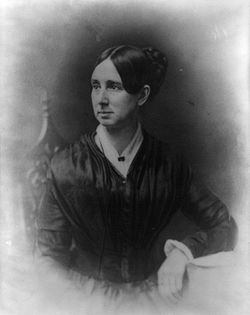Early Life Dorothea Dix was born on April 4, 1802 in Hampden, Maine to Joseph Dix and Mary Bigelow. She has the eldest of three children and lived in Vermont. Dix had a tumultuous childhood because her father was an abusive alcoholic and her mother was supposedly mentally retarded. She had to take over the parental role and raise her two brothers, Joseph and Charles. Despite her father’s alcoholism, he taught Dix how to read and write. This created her passion for reading and writing as well as teaching. She eventually taught her brothers how to be literate. At age twelve, Dix’s seventy-year-old grandmother Madame Dix took Dix and her brothers in to live with her in Boston. Dix had tremendous difficulty adjusting to the new wealthy life style and hated the demands her grandmother put on her. When she was fourteen, Dix was sent away to live with her aunt, Madame Duncan to become a proper lady after she gave away clothes to beggars outside the mansion. She would remain at her aunt’s for four years. Teaching Career
While at her aunt’s, Dix met her second cousin and attorney, Edward Bangs at a party. She told him of her dream to become a schoolteacher. He suggested she open up a “little dame school,” which was a private school for girls. Girls were only allowed to be taught by other women and were prohibited from public school. Dix was thrilled and Bangs helped her find a location. In the fall of 1816, at the age of fifteen, she began teaching her first twenty students. Dix would run this school three years. When she was eighteen and he was thirty one, Bangs confessed his love to Dix. She was frightened, closed down her school, and ran away to her grandmother’s mansion. Bangs still followed her and finally proposed. Scarred from her troubled childhood, Dix accepted but never set a date for the wedding. Dix sent her grandmother a letter asking if she could use the mansion as a school to teach both poor and wealthy girls. Madame Dix surprisingly agreed. However, things hit a sad note when Dix’s father died. It was at this time Dix realized she was not meant to marry Edward and called off her engagement. But her school in Dix Mansion officially opened in 1822. She taught there until 1836. Crusade for Reform
Dix began suffering from hemorrhages caused by tuberculosis. She stayed in England until January 1841 to recuperate. She returned to Boston and at age thirty nine, visited the East Cambridge Jail. She was appalled in seeing that all the prisoners, whether prostitute, drunk, or mentally ill, were all placed in the same unheated and unfurnished room. Dix wrote down notes, took the matter to the courts, and won. She secured a court order for much needed improvements in the conditions of the jail. This began Dix’s crusade for penal, asylum, and almshouse reform that first spread throughout state of Massachusetts. She visited these various institutions and first collected data by taking notes when visiting with jailers, caretakers, and townspeople. Dix saw that these buildings were overcrowded and smelled heavily like urine and feces. Some people were even chained to the walls. Next, Dix put together a document to send to the legislature. She presented it in 1843 and successfully convinced lawmakers to allocate funds for the expansion of the Worchester State Hospital. It was popular belief during Dix’s time that the insane could never be cured and were satisfied with their revolting conditions. Dix defied this notion by showing how bettering the environment can improve a mentally ill individual’s condition. Dix also travelled to other states to fight for reform. She used the same process as in Massachusetts. First, she would travel to the institution, next describe the conditions, then prepare the document, and lastly present it to the legislature. In 1844, Dix presented her findings in New York. The next year, she presented in New Jersey and Pennsylvania. Dix was able to visit every state on the east side of the Mississippi River. She played a role in establishing thirty two mental hospitals, fifteen schools, one school for the blind, and many other training facilities for nurses. In 1848, Dix sent a document to Congress, asking for five million acres to be set aside for the care of the mentally ill. In 1854, it was passed by both houses. Unfortunately, President Franklin Pierce vetoed the bill. Later Life
Afterwards, Dix traveled to England to rest. But there was no time to rest for her as she quickly noticed the large gap between private and public hospitals. She traveled to fourteen European countries until 1846, creating great change just like in America. Dix eventually returned to the U.S. in 1854. The Civil War occurred soon after Dix’s return. In 1861, she appointed Superintendent of Union Army Nurses. She was in charge of training, recruitment, and placement of about two thousand nurses. After the war’s end, in 1881, she helped establish a state hospital in Trenton, New Jersey. She had to enter the hospital herself due to illness. She died on July 17, 1887. |
Dorothea Dix |